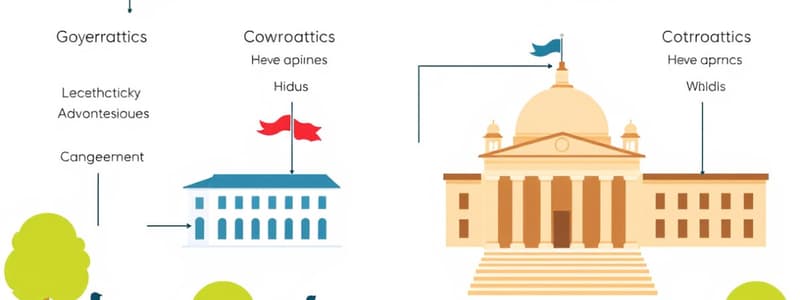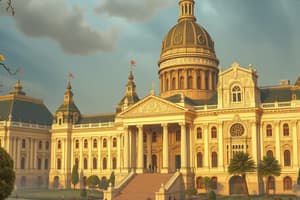Podcast
Questions and Answers
Which type of government is ruled by a single leader and not elected?
Which type of government is ruled by a single leader and not elected?
- Republic
- Dictatorship (correct)
- Democracy
- Monarchy
In a totalitarian system, multiple political parties are allowed to participate in elections.
In a totalitarian system, multiple political parties are allowed to participate in elections.
False (B)
What type of government is characterized by having a king or queen?
What type of government is characterized by having a king or queen?
Monarchy
In an ____ government, there is no formal government structure at all.
In an ____ government, there is no formal government structure at all.
Which type of government allows citizens to vote only for candidates selected by the government?
Which type of government allows citizens to vote only for candidates selected by the government?
Match the following forms of government to their characteristics:
Match the following forms of government to their characteristics:
The traditional theory of democracy promotes majority rule while ensuring the rights of the minority.
The traditional theory of democracy promotes majority rule while ensuring the rights of the minority.
What are the four theories of democracy mentioned?
What are the four theories of democracy mentioned?
What type of voting allows people to approve laws and public policies directly?
What type of voting allows people to approve laws and public policies directly?
In the elite theory of democracy, power is distributed among a large number of people.
In the elite theory of democracy, power is distributed among a large number of people.
What is the primary belief of the pluralist theory of democracy?
What is the primary belief of the pluralist theory of democracy?
The theory suggesting that too many groups compete for power, leading to inefficiencies in governance, is known as __________.
The theory suggesting that too many groups compete for power, leading to inefficiencies in governance, is known as __________.
Match the following theories of democracy with their descriptions:
Match the following theories of democracy with their descriptions:
Which group is cited as an example of an organization that promotes specific causes?
Which group is cited as an example of an organization that promotes specific causes?
In hyperpluralism, groups have too little power and influence on government.
In hyperpluralism, groups have too little power and influence on government.
What potential effect does hyperpluralism have on the political system?
What potential effect does hyperpluralism have on the political system?
Flashcards are hidden until you start studying
Study Notes
Types of Government
- Dictatorship: Ruled by a single leader who is not elected, often maintaining control through force.
- Military Dictatorship: Governed by the armed forces, often disregarding public opinions and rights.
- Totalitarianism: A single political party controls all aspects of life, with citizens forced to comply and restricted from leaving the country.
- Theocracy: Rulers claim authority based on religious beliefs or as representatives of a deity.
- Monarchy: Led by a king or queen, with power often inherited; can be absolute or constitutional.
- Parliamentary System: Governed by elected representatives from political parties, remaining in power as long as their party does.
- Republic: Officials are elected for specific terms to represent the voters, contrasting with hereditary systems.
- Anarchy: Absence of government, often emerging after civil conflicts with competing groups seeking power.
Authority in Government
- Revolutionary Authority: Established when a current governance structure is overthrown by a new ruling group, which can vary in size.
- Totalitarian Control: Citizens vote only for government-approved candidates, with no election of opposition parties.
- Oligarchy/Plutocracy: Governance by a small elite group acting in their own interests, often reflecting wealth, privilege, and familial connections.
- Democracy: Elected government by the populace, where every eligible citizen has the right to vote, shaping the leadership.
Theories of Democracy
- Democracy Definition: Characterized by public involvement; greater participation results in a stronger democratic system.
- Traditional Theory: Advocates majority rule while respecting individual rights, recognizing all citizens' worth and enabling both direct and representative voting.
- Elite Theory: Argues that political power is concentrated among a small group, leading to policies that favor elite interests over the general populace.
- Pluralist Theory: Suggests that diverse groups advocate for their interests, preventing any single entity from dominating; healthy competition among groups influences political agendas.
- Hyperpluralism: Similar to pluralism but posits that excessive group influence can hinder the political process, leading to conflicts between judicial and legislative systems, creating inefficiencies in governance.
Studying That Suits You
Use AI to generate personalized quizzes and flashcards to suit your learning preferences.




